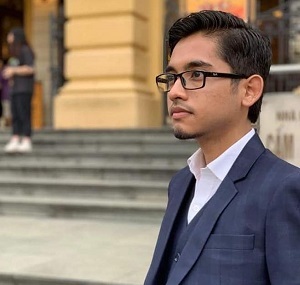Staff profile
Ahmed Hassan

| Affiliation |
|---|
| Member of the Durham Law School |
Biography
Ahmed Shafquat Hassan is a full-time PhD Candidate at the Durham Law School, Durham University. His primary focus is on constitutional law and human rights protection. Ahmed Shafquat also serves as a law tutor with the Durham University International Studies Centre.
Prior to beginning his PhD, Ahmed Shafquat was a Research Associate at the Centre for Peace and Justice, BRAC University, where he conducted research on the Rohingya refugee situation in Bangladesh. During his time at BRAC University, He also designed a short course on Refugee Studies, offered to professionals across the world through the University’s platform.
Ahmed Shafquat Hassan was called to the bar of England and Wales in 2018 by the Honourable Society of the Inner Temple and is an accredited Civil and Commercial Mediator with ADR-ODR International. He practiced as a pupil lawyer in Bangladesh with Probir Neogi and Associates in 2018-2019, predominantly concerning himself with constitutional, civil, and financial criminal cases undertaken by the chambers.
After spending a year as a pupil barrister he obtained an LLM in International Law and Governance at Durham University. His Master’s thesis focused on the Horizontal application of Bangladesh’s constitutional provisions.
Ahmed has published a series of articles with national daily newspapers, critiquing various policies, including the national budget, and opining on a myriad of social issues, such as minority rights and secularism. He has also published legal and political essays in reputed journals including the Oxford Political Review and has presented at conferences including the Asia Pro-Bono conference in 2021 and the Annual Syposium on Difference and Justice 2021, Bard College. He has since lectured on numerous forums.
Ahmed Shafquat has spent a majority of his academic career as a competitive debater, having won national titles and competed at the World Universities Debating Championships. He also has a strong record of adjudicating debates across Asia.
Ahmed Shafquat has been an ardent advocate for equitable policies and secularism in Bangladesh and across the world. His professional career and academic writing has mostly been geared towards the use of Human Rights mechanisms to achieve these principles.
Current Research
Research Outline:
Ahmed Shafquat’s research argues that while Bangladesh’s enumeration of the Fundamental Rights in Part III of the constitution purports to protect the right of all individuals practicing their individual religions, it fails to do so equally. As such, the functionality of this application is unconstitutional in its operation as implemented by the Courts. The proposed paper seeks to analyse the reasons behind this inequality and the impact this has had on the civil liberties of people of Bangladesh. This is with the understanding that Bangladesh’s polity is somewhat divided because of its tumultuous relationship with religion as a central state ideology.
The research addresses the constitutional validity of the enshrinement of a state religion in Bangladesh’s constitution despite enshrining a commitment to secularism and the abolishment of any political status for any religion. The research analyses the historical development of the principle of secularism in Bangladeshi politics, while paying attention to the narrative significance the principle has in relation to Bangladesh’s liberation. The paper focuses on the reliance on secularism as a tool for Bangladesh’s nation-crafting process and the necessity for it to be protected. In doing so, the paper will analyse the need for intervention in the form of a recognition of invalidity of either one of the articles in favour of either secularism or Bangladesh’s religious identity. The research will also analyse the best possible mode of intervention – whether by parliament or by court – in lieu of a reliance on the rights-based approach to protection of minorities that the constitutional structure already adopts.
Ahmed Shafquat’s work takes a socio-legal and contextual constructive model approach to the analysis through a particular lens looking into Bangladesh’s political history. It draws from long-standing constitutional theories analysed against a backdrop of Bangladesh’s turbulent political history.
Significance:
This research is original and significant for two reasons. First, Bangladesh’s constitution has rarely been discussed from a socio-legal perspective analysing the political impact of the constitution’s changes. Further, the effect of political and democratic backsliding in relation to the constitutional text is yet to be explored in contemporary literature. Second, while most literature argues against judicialisation, with limited literature explaining its benefits, such discussion does not exist in the specific context of Bangladesh’s constitutional structure. The research takes the unconventional route of favouring judicialisation over democratic approaches to protect minority rights. The proposition will be applicable to other similar jurisdictions where demagoguery is rising in the face of majoritarian political motives.

